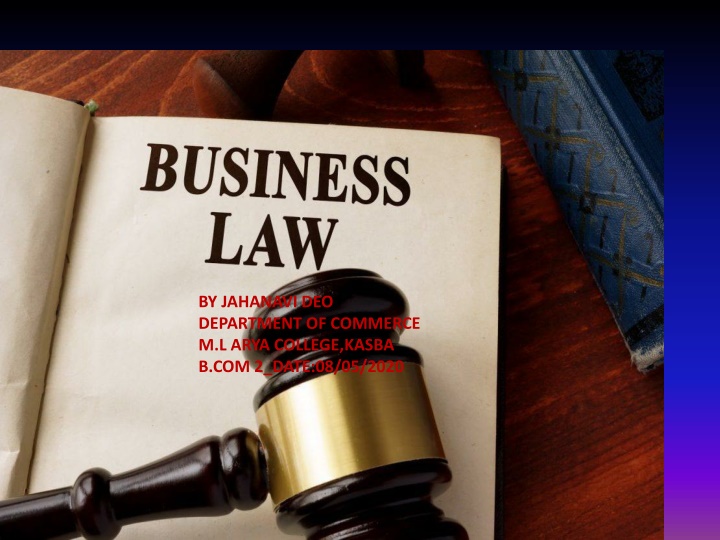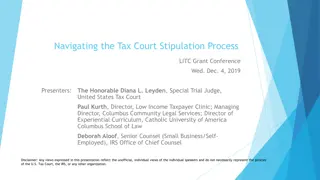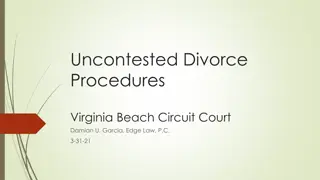
Stipulations as to Time in Contracts of Sale
Learn about stipulations regarding time in contracts of sale, including delivery and payment timelines. Explore the concept of conditions and warranties, with practical examples illustrating their distinction in contract law.
Download Presentation

Please find below an Image/Link to download the presentation.
The content on the website is provided AS IS for your information and personal use only. It may not be sold, licensed, or shared on other websites without obtaining consent from the author. If you encounter any issues during the download, it is possible that the publisher has removed the file from their server.
You are allowed to download the files provided on this website for personal or commercial use, subject to the condition that they are used lawfully. All files are the property of their respective owners.
The content on the website is provided AS IS for your information and personal use only. It may not be sold, licensed, or shared on other websites without obtaining consent from the author.
E N D
Presentation Transcript
BY JAHANAVI DEO DEPARTMENT OF COMMERCE M.L ARYA COLLEGE,KASBA B.COM 2_DATE:08/05/2020
Stipulations as to time Stipulations as to time in a contract of sale fall under the following two heads: 1. Stipulation relating to time of delivery of goods 2. Stipulation relating to time of payment of the price
As regards the time fixed for the delivery of goods, time is usually held to be the essence of the contract . Thus if time is fixed for delivery of the goods and the seller makes a delay, the contract is voidable at the option of the buyer. In case of late delivery, therefore, the buyer may refuse to accept the delivery and may put an end to the contract. As regards the time fixed for the payment of the price, the general rule is that time is not deemed to be the essence of the contract , unless a different intention appears from the terms of the contract (sec. 11). Thus even if the price is not paid as agreed, the seller cannot avoid the contract on that account. He has to deliver the goods if the buyer tenders the price within reasonable time before resale of the goods. The seller may, however, claim compensation for the loss occasioned to him by the buyer s failure to pay on the appointed day.
Sec. 12(2) defines a condition as, a stipulation essential to the main purpose of the contract, the breach of which gives rise to a right to treat the contract as repudiated (denied), Sec 12(3) defines a warranty as, stipulation collateral to the main purpose of the contract, the breach of which gives rise to claim for damages but not to a right to reject the goods and treat the contract as repudiated . The effect of a breach of a condition is to give the aggrieved party a right to treat the contract repudiated, i.e., if price has been paid, the buyer can claim the refund of price plus damages for breach In case of breach of warranty , only damages can be claimed, i.e., the buyer must accept the goods and claim damages for the breach of warranty Whether a stipulation in a contract of sale is a condition or a warranty depends in each case on the construction of the contract A stipulation may be a condition though called a warranty in a contract [sec. 1)
Example: 1 Kaushal asks a dealer to supply him a shirt which would not shrink after use and wash. The dealer supplies a shirt which shrinks after use and wash. Kaushal can reject the shirt or keep the shirt and claim damages. Here the stipulation to supply a shirt which would not shrink after use and wash is a condition. Now if Kaushal buys a particular shirt which is warranted by the dealer to be one which would not shrink after use and wash and the shirt does shrink after use and wash, Kaushal s only remedy is to claim damages Example: 2 A man buys a particular horse which is warranted quiet to ride and drive. If the horse turns out to be vicious, the buyer s only remedy is to claim damages. But if instead of buying a particular horse, a man asks a dealer to supply him with a quiet horse and the dealer supplies him with a vicious one, the stipulation is a condition, and the buyer can return the horse and can also claim damages for breach of contract The illustrations are a clear proof of the fact that an exactly similar term may be a condition in one contract and a warranty in another depending upon the construction of the contract as a whole






















